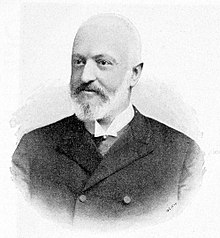Karel Bendl

Karel Bendl (born April 16, 1838 in Prague ; † September 20, 1897 there ) was a Czech composer .
Life
His grandfather, who taught him to play the piano, aroused his interest in music. He learned the handicraft of the glove maker and graduated from Karl Pietsch's organ school in 1858, focusing on the then new forms of choral interpretation, two-part and polyphonic singing.
From an early age he performed in music salons and sang tenor in choirs. Just three years later he received a prize for his self-composed song Poletuje holubice .
Since 1863, when the Umělecká beseda artists' association was founded, he organized its musical department. In the autumn of 1864 he left Bohemia and looked for new impressions abroad on his study trip. In Brussels he got the position of second conductor at the Deutsche Oper. After their financial bankruptcy, he went from there to Amsterdam and Paris .
In 1865, back in Prague, he was elected director of the Hlahol Choir as the successor to Bedřich Smetana , which he then made artistically one of the largest ensembles and directed until 1877.
At the same time he composed his first opera Léjla, which premiered on January 4, 1868 and was accepted by the public and critics. From 1874 to 1875 he was the second conductor of the National Theater (at that time still provisional theater).
In 1877, Bendl resigned from the management of Hlahol, which, contrary to his ideas, added more and more contemporary works to its repertoire. He then took over the position of choirmaster in St. Nicholas Cathedral in Prague's old town until 1878.
In 1878 he took up the position of Kapellmeister in the private chapel of the Russian Baron von Dervies in Lugano and Nice . During this time, with daily rehearsals from the extensive repertoire with works from famous classics up to modern times, he deepened his knowledge and skills. He continued to compose and, at the suggestion of his benefactor, wrote the opera Gina, and his composition Švanda dudák , a work with his own setting of the Bohemian melody. In 1881 he stayed briefly in Milan. After his return to Prague, he edited the music supplement to the "Humoristische Blätter" (Humoristické listy) (1883–86) and published a number of small salon pieces by famous composers. In addition, he edited small song books for male choirs that appeared under the name Hlahol.
After Antonín Dvořák left for America in 1894, Bendl took over his composition class at the Prague Conservatory . He held this position until his death.
Significant works
His works contain Slavic and Far Eastern as well as Turkish components. Cosmopolitan elements appear in his late compositions. He wrote nine singspiele and 12 pieces for choir and orchestra as well as 7 instrumental compositions and numerous songs.
Most of his compositions are in the National Museum, but a detailed list of his works has so far been missing.
Opera
- Lejla
- Břetislav a Jitka
- Starý ženich, comic national opera based on Bedřich Smetana's The Bartered Bride
- Čarovný květ, comic opera with libretto by Eduard Rüffer .
operetta
- Indická princezna
Singing games
- Černohorci
- Karel Škreta
- Gina (Libretto Gaetano Cimini)
- Erbenovy Štědrý den
- Dítě Tabor (text by Eliška Krásnohorská )
- Červená karkulka
- Po bitvě Bělohorské
- Kališníci
- Umírající Husita
- Ciganské melody
- Hebrejská elegie
- Smrť Prokopa Velkého
- Ptáče
- Při předení
- Zpěv vil nad vodami (For female voices with orchestra)
- Národ sobě (cantata)
Instrumental pieces
- tarantella
- Jihoslovanská rhapsody
- Slavnostní pochod
- Koncertní polonéza
- Svatební průvod
- Slavnostní předehra
- Dithyramb a Preludium
- Scherzo and Romance for violin and orchestra.
Religious music
- Mass in D minor for male voices
- Ave with organ accompaniment
literature
- Monika Bártová-Holá: Po stopách tříletého působení Karla Bendla v cizině . In: Opus musicum 29, 1997, ZDB -ID 1141611-7 , pp. 7-15.
- Monika Bártová: Reflexe italských vlivů v operní tvorbě Karla Bendla jako důsledek jeho tříletého pobytu v románských zemích . Brno 1994, (Brno, Univ. Diss., 1994).
- Eliška Krásnohorská : Z mladých let Karla Bendla. Osobní vzpomínky . In: Osvěta. Listy pro rozhled v umeni, vede a politice 27, 1897, pp. 959–976, (Also as: Z mého mládí. Vzpomínky životopisné . Vaněk a Votava, Smíchov 1920).
- Josef Mikeš: Sbory Karla Bendla . Prague 1957, (Prague, Univ. Diss., 1957), (Partial print in: Miscellanea musicologica 14, 1960, ISSN 0544-4136 , pp. 79–81), (With list of choral works).
- Josef Polák: Karel Bendl . Hudební nakladatelství Pěvecké obce československé, Prague 1938.
Web links
- Literature and other media by and about Karel Bendl in the catalog of the National Library of the Czech Republic
- Complete catalog of works
- Stage works
| personal data | |
|---|---|
| SURNAME | Bendl, Karel |
| BRIEF DESCRIPTION | Czech composer |
| DATE OF BIRTH | April 16, 1838 |
| PLACE OF BIRTH | Prague |
| DATE OF DEATH | September 20, 1897 |
| Place of death | Prague |

